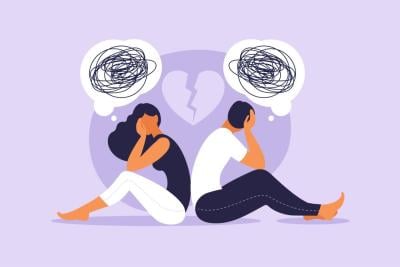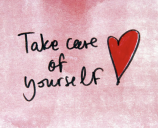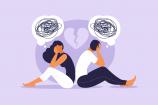How to Move on From a Breakup: Using "Opposite Action" to Love to Survive Valentine’s Day
How to Move on From a Breakup: Using "Opposite Action" to Love to Survive Valentine’s Day

Valentine’s Day, for those in love or in a relationship, is usually celebrated with a romantic evening. For those struggling to get through a breakup or get over someone, it can be spent in misery and hopelessness, fearing that things will never get better. Ending a relationship with someone we care about is so difficult. It can lead us to question our own self worth, feel intense feelings of loneliness, and even feel hopeless. Especially in a season where being in love is so publicly flaunted, our feelings of sadness can be really amplified and can potentially lead to some action that actually makes us feel worse in the long run.
Often times, people struggling to move on from a breakup inadvertently act in ways that amplify their emotions of love towards the person. This could look like meeting up with an ex, calling or texting them, or scrolling through their social media. All of these actions stem from the emotion of love. Love activates our urges to build connection. However, if the love is unrequited or no longer justified, acting on these urges can be ineffective and only make us feel worse in the long term.
So, what can we do?
Enter “Opposite Action.”
Opposite action is a DBT skill that shares the same basic tenets of exposure therapy. In order for emotions to go down, we have to do the opposite what your emotions want you to do. For example, following a breakup, many have the urge to stay at home and isolate due to intense feelings of sadness. In order for the emotion of sadness to go down, we would need to do the opposite: get activated, go out with friends, and stay connected.
What does opposite action to love look like?
- The first step is to determine whether your feelings of love are justified. Love is justified when the person you love enhances your quality of love or brings you closer towards your goals. Chances are if your relationship has ended and the other person has made it clear that they do not want to get back together, the love is no longer justified.
- The second step is to identify what the urges associated with the love are. Is my urge to check their Instagram? Is my urge to text them? Is my urge to talk about them constantly with my friends? The third step is to identify what the opposite action urge could be. Is it blocking them? Is it unfollowing them? Is it resisting the urge to talk about them?
- The final, and hardest step is to act opposite all the way! Block them! Delete pictures! Resist the urge to talk about the relationship with your friends.
While this may seem simple, opposite action to love is very difficult, just like exposure therapy for spiders is hard for someone who is arachnophobic. And, just like with exposure therapy, the more you work at it, the easier it gets, and the emotions can actually go down and we can move forward.
Here is a helpful exercise you use when noticing unhelpful action urges associated with unjustified love:
- Identify your current thoughts and beliefs about your ex-relationship
- What action urges am I currently experiencing?
- How intense are these urges from 1-5?
- Is what I want to do in life with my personal growth and values?
- What are the opposite actions to these urges? What does this look like?
- How can I practice the opposite action?
Moving forward after a breakup is always difficult, especially when feelings of love linger. This Valentine’s Day, don’t let those feelings dictate your actions, instead use opposite action to help change how you feel!
















